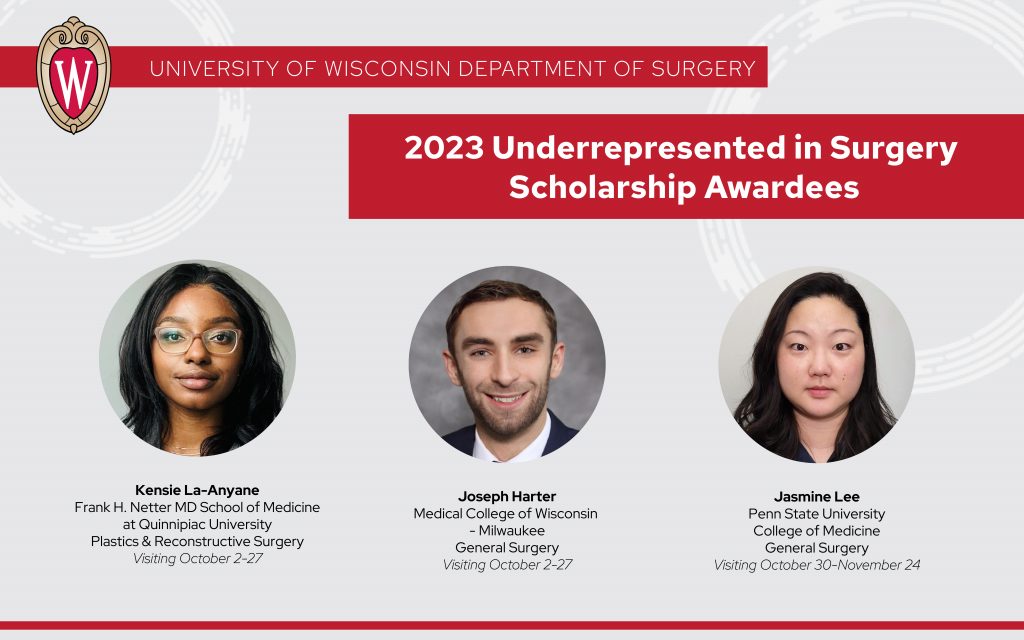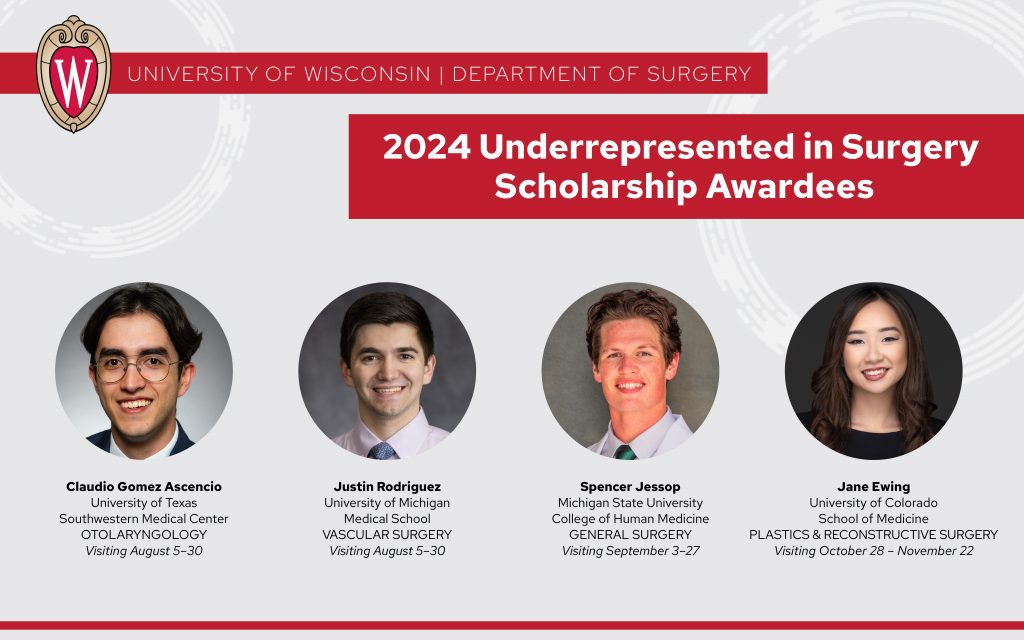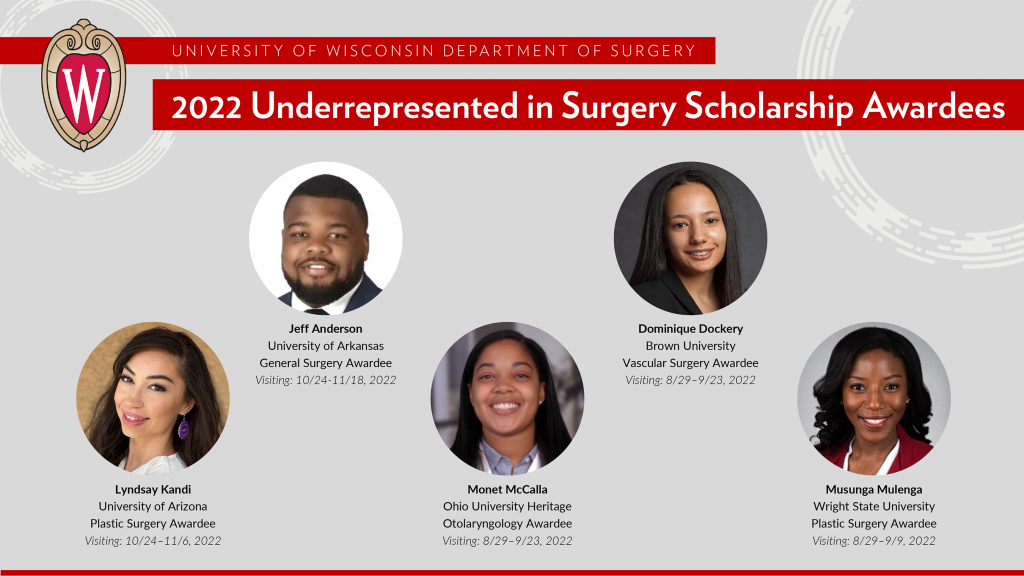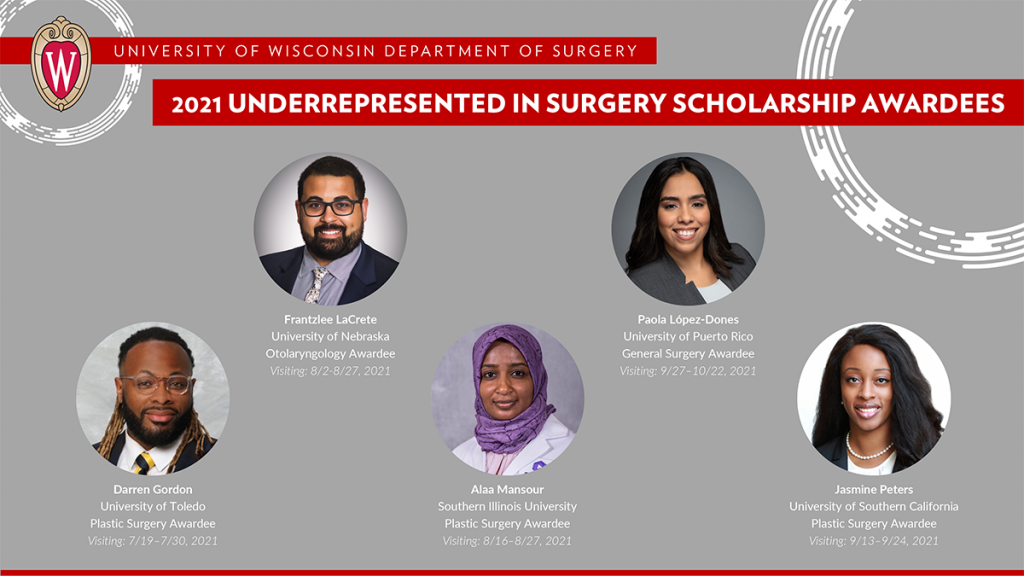Applications for 2026 cohort are due on April 30th, 2026.
PROGRAM OVERVIEW
The Underrepresented in Medicine (URiM) Visiting Student Scholarship Program, sponsored by the Department of Surgery, supports qualified 4th-year medical students from underrepresented backgrounds in medicine in developing their clinical skills, abilities, and potential through a visiting rotation, mentorship, and networking opportunities.
PROGRAM COMPONENTS
In addition to providing recipients with a financial award to cover the cost of their visiting rotation, the programs’ components allow recipients to build meaningful relationships with faculty and residents in the University of Wisconsin – Department of Surgery.
URiM Visiting Student Scholarship Recipients benefit from:
- Ongoing application and career advising from faculty and residents
- Paired faculty mentor and resident peer-mentorship opportunities
- Meetings with residency program directors or associate program directors
- Social media networking bio development with marketing professionals
- Networking social events with faculty and residents
THE FINANCIAL AWARD
The program will pay a $4000 stipend to URiM Visiting Student Scholarship recipients on a four-week rotation. These funds are intended to support costs associated with participation in our program.
PROGRAM ELIGIBILITY
To be eligible for the DOS URiM Visiting Student Scholarship Program, prospective students must meet one or more of the criteria below:
- High level of financial need; and/or
- First generation college student (neither parent received a baccalaureate degree); and/or
- Speak a language in addition to English; and/or
- Students likely to contribute varied perspectives to the program because of their life experiences, including overcoming personal adversity or family hardship, records of extensive community service, or successful careers in other fields; and/or
- Significant barriers to achieving higher education, such as experience in the foster care system, living in a single-parent household, having an incarcerated parent, or responsibilities for providing financial support or primary care for other household members; and/or
- Grew up in one of the following areas: a) a U.S. rural area, as designated by the Health Resources and Services Administration (HRSA) Rural Health Grants Eligibility Analyzer (https://data.hrsa.gov/tools/rural-health), or b) a Centers for Medicare and Medicaid Services-designated Low-Income and Health Professional Shortage Areas (qualifying zip codes are included in the linked file); and/or
- Has had experiences of adversity, which could include discrimination; and/or
- Special consideration will be given to those applicants whose prior work experience, area of study, community service, or other accomplishments is predictive of future service to populations that have health disparities
In addition, all prospective students must also meet ALL criteria outlined below:
- Plan on applying to General Surgery, Plastics & Reconstructive Surgery, and/or Vascular Surgery for residency
- Enrolled in an LCME or AOA accredited medical school
- U.S. Citizen, Canadian citizen, or permanent resident of the United States
- In their final year of training at the time of rotation at the University of Wisconsin School of Medicine and Public Health
Note: All applicants must complete a Visiting Student Learning Opportunities (VSLO) application and submit all required items of UWSMPH. For instructions on how to submit, visit MD Program Office of Visiting Students.
SELECTION PROCESS
The Department of Surgery URiM Visiting Student Scholarship Application Committee reviews all applications to each scholarship. Selection of students is based on an individualized, holistic review of each application, including (but not limited to) the students’ demonstrated personal integrity, commitment to service and civic/community engagement, persistence in and commitment to academic success, capacity to grow as a leader, and potential to excel as a surgeon in their field.
AVAILABLE ROTATIONS
Rotations are four weeks in duration on General Surgery, Vascular Surgery, and Plastics & Reconstructive Surgery. Rotations are offered July — October.
TIMELINES AND APPLICATION
To be considered for the UW Department of Surgery URiM Visiting Student Scholarship, students should apply by 11:59 PM CST on April 30th, 2026.
To ensure full consideration of your application, follow the steps below:
- Complete the URiM Visiting Student Elective application
- Receive correspondence on the status of your application through the UWSMPH Department of Surgery Medical Student Education Office
- If selected, complete the Visiting Student Learning Opportunities (VSLO) application. Submit all required items for UWSMPH
APPLICATION REQUIREMENTS
- 1 Letter of Reference
- Designate a person directly involved in your medical education that can speak to your abilities as a student and leader
- Instruct the person to email the letter directly to umesurged@surgery.wisc.edu by the application deadline.
- Personal Statement (500 words maximum)
- Current curriculum vitae
- Supplemental essay question
- Past Experiences – Select one experience that has been most influential in your life thus far.* (300 words or less)
- Detail what the experience was, why it was meaningful, what you learned, and how it influenced your career development and goals. Some examples:
- Education/training
- Military service
- Professional organizations
- Research
- Teaching/mentoring
- Volunteer/service/advocacy
- Work
- Other extracurricular activities, clubs, or hobbies
*The Past Experiences section is similar to what you will see on supplemental ERAS applications. This is intended to offer you practice in thinking about what past experiences have been influential in your career goals and development.
Past Participants
Click on the graphics to view full size.

“I really appreciated the mentorship and positivity from those I worked with! This demonstrated a commitment to education and a close-knit learning community. Thank you for this special rotation experience!”
“I really appreciated the opportunities to meet with Dr. Chiu, Dr. O’Rourke, and Dr. Minter.”
“I appreciated that faculty mentors went out of their way to coordinate time to meet.”


